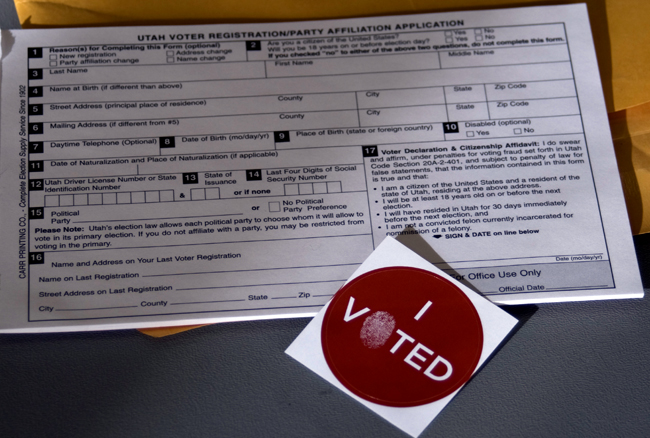Expectations high for student voters
Thousands of USU students registered to vote in the upcoming presidential election thanks to a voter registration campaign this month. However, the battle of getting students to the polls is only half won, said Jackson Olsen, director of USU’s Government Relations Council.
“The campaign went extremely well, we registered close to 4,100 students which, on a campus this size, is one out of every four students,” Olsen said. “The tricky part now, however, is actually getting them to cast their ballots on Nov. 4.”
In years past, students have followed the trend of showing great interest in voting by signing up and wearing pins, but failed under the pressures of school and other commitments to actually make it to the polls, he said. This year, however, Olsen said he believes students will outgrow that stigma.
“Statistically only 80 percent of registered students actually vote. My guess is this year we’ll do better than that,” Olsen said. “I think people are so passionate about their candidates and who they are supporting that there are few people who are registered who won’t actually go to vote.”
Olsen attributes this new-found passion to the realization among young voters that the outcome of this election can really affect them. No longer do tax cuts, health insurance issues and social security problems rest on the shoulders of parents, but on the shoulders of the young adults, he said.
The campaign was also designed to invite students who are registered to vote in other counties to register locally so they have the convenience of voting on campus, he said.
However, in the 2004 election young adults were supposed to come to the polls in much larger number than they really did, said the head of the political science department, Roberta Herzberg.
Similar registration campaigns such as Rock the Vote took place on campuses across the nation four years ago and thousands told pollsters they intended to vote and didn’t, changing the outcome of the election, Herzberg said.
“There are still question marks about whether of not young people will actually turn out as they intend to because their lives are fairly busy and they haven’t been used to voting, it isn’t part of their makeup yet,” she said.
However, Herzberg said there is a different excitement surrounding the candidates and the issues in this election which will most likely play a large role in bringing young voters to the polls on the fourth. Many young voters have the mentality that they control this election which gives them increasing motivation, as well, she said.
To make it even more convenient for students there is early voting that is taking place on the second floor of the TSC and at the County Clerk’s Office, Herzberg said. By voting early, students won’t have to deal with long lines or possibly missing a class to go vote.
However, some students wonder how valid their vote really is in a state as historically Republican as Utah.
“Voting in a state as conservative as Utah, or conversely in a state that’s so liberal, your vote’s not going to matter. That’s the way our system is set up with the electoral college,” said Jon Adams, junior majoring in political science.
But even with this knowledge in hand, Adams said he wouldn’t not vote because the act of voting is what sets a democratic society apart from others.
“The vote itself is rather ineffectual, but I think as a symbolic measure it’s incredibly important because it is the capstone of democratic action. Voting may not be the most effective, but it is both the manifestation and celebration of our democratic society,” he said.
However, this is not always the case, he said. In local and state elections a vote doesn’t go through the filter of an electoral college, instead it counts as an individual raise of the hand that could determine the outcome, arguably making it more significant, Adams said.
But Adams said he also advocates that voting is not the only form of democratic action.
More often than not, protesting, picketing and participating in campaigns plays a much bigger role in the overall scheme of the democratic process. Even the act of purposefully not voting can stand as its own statement.
“When people who are informed choose not to vote, that can itself be an expression of democracy as it arguably communicated dissatisfaction with our political system,” Adams said.
But whether an individual chooses to vote or not vote, Adams, Herzberg and Olsen all agree that being informed is the most important part of the voting process. Voting blindly just for the sake of voting can actual have adverse affects on the system.
“It’s not enough to vote, you must also be informed. It’s easier just to vote blindly– it requires less effort,” Adams said. “But it defeats the purpose of voting. You vote to advance your interests and the common good, but if you don’t know what candidates or propositions accomplish that, what’s the point?”
–greg.boyles@aggiemail.usu.edu

